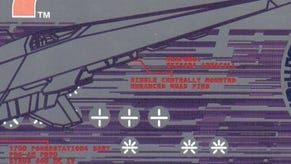Videogame epilepsy tests are "subjective", says WipEout HD dev
"A lot of games" fail them initially.
Sony's Liverpool studio has spoken out for the first time on the problems caused by WipEout HD's failure of a routine epilepsy test.
Chatting to Eurogamer at the Leipzig Games Convention last month, game director Tony Buckley revealed the headaches arising from the eleventh hour hitch. The game was being readied for release back in July, but there was what SCEE boss David Reeves described as a "specific technical problem" - later established to be issues that came up during the epilepsy screening procedure.
"[It was] frustrating more than anything, because it's quite subjective the whole test," said Buckley. "But we certainly weren't going to take it lightly. We had to think long and hard about how we approached it, because there were ways and means of doing it, but in the end we managed to actually solve any issues without any detriment to the game. That was our worry, that the game would suddenly look poorer as a result of it, but no, it's all gone really well."
Buckley further claimed that, rather than this being a WipEout-specifc issue, "a lot of games" initially fail the testing process, which is designed to identify material that may pose a risk to sufferers of photosensitive epilepsy.
The team re-engineered the game to fix the problem, but Buckley acknowledged it was still a grey area for developers. "The hardware that actually does the test, it's quite... Subjective," he explained. "So, you know, it's difficult to pinpoint what the actual issues are, and whether they are actually issues, to be honest.
"[But] we take it seriously, so we made the effort and as you can see it's come out the other end alright, with a lot more content."
The superb WipEout HD finally releases on 25th September, available via PSN for GBP 11.99. You can find out why we love it so in our WipEout HD review.
There's more from our interview with Tony Buckley over on Eurogamer TV, where you can also check out exclusive gameplay clips of the Anulpha Pass, Moa Therma and Chengou Project circuits.






